30 Nov2020
By Caitlin Wilson
 Mursion CEO Mark Atkinson hosted AACTE’s President and CEO Lynn M. Gangone for a virtual fireside chat in culmination of a multi-part series highlighting how Mursion’s virtual simulation classroom is being used in educator preparation programs. To start the conversation, Gangone reflected on how the pandemic has shaped the need to collaborate and to think differently on the delivery of instruction in the P-20 setting. She noted, “In our strategic planning process we created a vision to revolutionize education for all learners. We had no idea how prescient that was because of the pandemic.”
Mursion CEO Mark Atkinson hosted AACTE’s President and CEO Lynn M. Gangone for a virtual fireside chat in culmination of a multi-part series highlighting how Mursion’s virtual simulation classroom is being used in educator preparation programs. To start the conversation, Gangone reflected on how the pandemic has shaped the need to collaborate and to think differently on the delivery of instruction in the P-20 setting. She noted, “In our strategic planning process we created a vision to revolutionize education for all learners. We had no idea how prescient that was because of the pandemic.”
Rethinking clinical practice with the use of simulation is just one way in which innovation has supported the delivery of high-quality preparation without having to be on-the-ground. This helped accelerate AACTE’s collaboration with Mursion.
In addition to addressing the challenges and innovations brought on by the shift to virtual learning, Gangone and Atkinson also discussed efforts nationally to promote an antiracist agenda in schools to ensure the fair and equitable treatment of students. Gangone mentioned the importance of AACTE’s work in the area of diversity, equity, and inclusion. “We know that we all have implicit bias and that systemic racism exists,” she said. “So AACTE has been doing a lot of work in this area, from entrance exams into programs to other barriers to enter the profession.”
The discussion also focused on how simulation can support both teacher candidates and teacher preparation faculty in addressing their own inherent or implicit biases, which often carry into the classroom. “Simulation gives us an opportunity to deal with our own biases in ways that are really powerful and not bring harm,” commented Gangone. Engaging teacher education faculty in the simulation space could not only help to address biases and equity, but to better understand social and emotional learning, and effective pedagogy. There are a great number of possibilities when thinking through combining scholarship with simulation to move the field of education forward. Atkinson noted, “There is so much that we can bring to the floor, for teachers and leaders together, to really improve the way children experience school once they can get back into them again.”
Listen to the full recording of this conversation.
AACTE and Mursion are collaborating to support teacher preparation through the pandemic and beyond. Learn more details about this collaboration.
30 Nov2020
By Caitlin Wilson
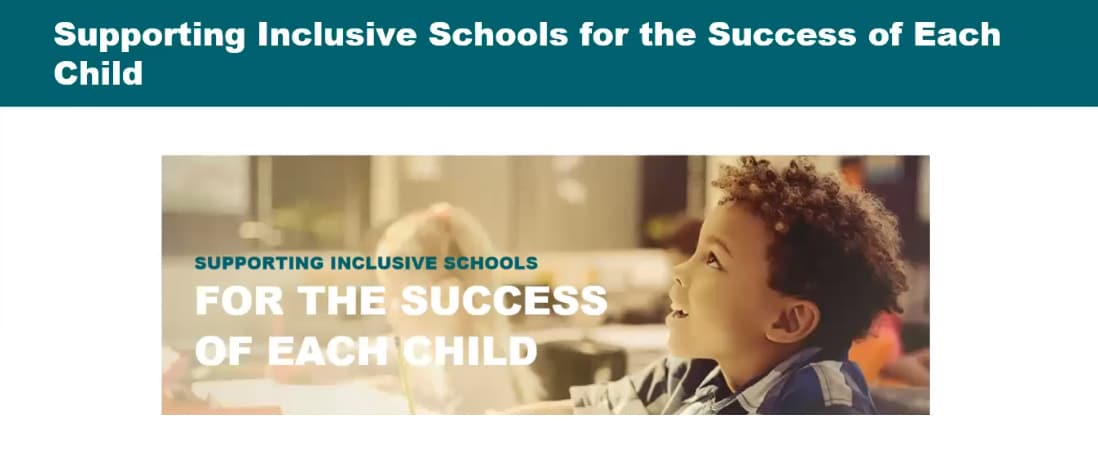 Last month, AACTE partnered with CCSSO, the Center on Great Teachers and Leaders at the American Institutes for Research, and the CEEDAR Center to discuss how teacher candidates can be leveraged as assets for PK-12 districts navigating online learning and uncertainty during the pandemic. During the webisode hosted by CCSSO, Loretta Mason-Williams from Binghamton University, Jacqueline Rodriguez from AACTE, and Christian Rodgers from AASA set the stage for how the needs of teacher candidates, schools, and families are changing in 2020. With this shift in needs comes opportunities for both schools and teacher candidates.
Last month, AACTE partnered with CCSSO, the Center on Great Teachers and Leaders at the American Institutes for Research, and the CEEDAR Center to discuss how teacher candidates can be leveraged as assets for PK-12 districts navigating online learning and uncertainty during the pandemic. During the webisode hosted by CCSSO, Loretta Mason-Williams from Binghamton University, Jacqueline Rodriguez from AACTE, and Christian Rodgers from AASA set the stage for how the needs of teacher candidates, schools, and families are changing in 2020. With this shift in needs comes opportunities for both schools and teacher candidates.
This webisode also featured faculty and staff from AACTE member institution, Boston University, and Boston public schools, along with Lindsey Decker, a current teacher candidate. Decker shared her experiences supporting her mentor teacher in an online environment and noted “teachers are looking for additional adults to be in the classrooms.” In the virtual environment, Decker said she works with learners in small breakout groups and “one-on-one to lessen the gap that we’re seeing from the pandemic.”
17 Nov2020
By Monika Jo
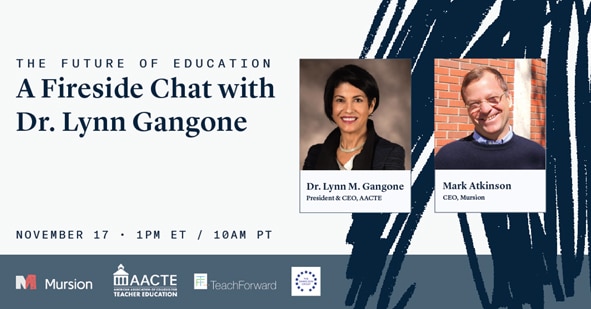 Please join us Tuesday, November 17, 1:00 p.m. ET for a joint reflection on 2020 and a look forward to the coming year. Mursion Co-founder and CEO, Mark Atkinson will host a fireside chat with AACTE President and CEO Lynn M. Gangone. Join the conversation as they share their perspectives on
Please join us Tuesday, November 17, 1:00 p.m. ET for a joint reflection on 2020 and a look forward to the coming year. Mursion Co-founder and CEO, Mark Atkinson will host a fireside chat with AACTE President and CEO Lynn M. Gangone. Join the conversation as they share their perspectives on
- The current state of teacher prep programs
- What will go back to “normal” vs. what innovations for coping with the pandemic will stay
- Models and systems are on the table for reinvention, writ large, what does this mean for higher education?
Register now for the free event.
The recorded session will be available for viewing.
16 Nov2020
By Matthew Wales

Applications are now being accepted for the new AACTE Video Observation Technology Implementation Grant. This opportunity, in collaboration with Edthena, is available exclusively to AACTE members.
Given the many challenges that educator preparation programs have weathered in 2020, AACTE and Edthena have created this grant opportunity to provide some much needed relief for up to 20 AACTE members. Each grantee will be awarded up to $25,000 in grant funds, which will be utilized to implement the Edthena platform for the upcoming Spring 2021 semester.
For those AACTE member institutions interested in applying:
- Active AACTE members in good standing, and not already an Edthena partner, are eligible for the grant.
- Matching of grant funds are not required during this Spring 2021 offering.
- Continuing Edthena implementation after the grant period is not required.
- Grantees will receive implementation and planning support from the Edthena team to build a deployment strategy for the spring semester.
- Awardees will receive access to the relevant edTPA toolsets needed for your program (where applicable).
- AACTE team members will also participate in onboarding training with grantees, where possible, to help connect awardees with additional resources.
09 Nov2020
By Jerrica Thurman

AACTE is collaborating with Edthena to provide $500,000 in grant funding to teacher education programs for Spring 2021.
AACTE member institutions may apply by December 7, 2020, to receive up to $25,000 for implementing video observation technology to support their teacher candidates during COVID-19 and beyond. Through this partnership, up to twenty AACTE members will receive grants for the upcoming Spring 2021 academic term.
A leader in video observation and collaboration technology, Edthena is widely used by schools, districts, and teacher education programs across the country. The technology platform enables teacher candidates to upload videos of their practice and faculty to provide feedback at specific moments in time. An approved edTPA platform provider, Edthena’s video technology can be utilized in methods courses, field observations, edTPA skill building, and group learning, making it possible to capture data for candidate growth and program improvement.
02 Nov2020
By Amber Benedict
 The CEEDAR Center is working on a collaborative effort to collect information from educator preparation programs across the country who are implementing effective, practice-based opportunities for teacher candidates within a virtual space. We’d like to invite you, your colleagues, and your partners (if applicable) to participate in a survey focused on online education for teachers of students with disabilities.
The CEEDAR Center is working on a collaborative effort to collect information from educator preparation programs across the country who are implementing effective, practice-based opportunities for teacher candidates within a virtual space. We’d like to invite you, your colleagues, and your partners (if applicable) to participate in a survey focused on online education for teachers of students with disabilities.
If you previously utilized an online teacher education program before COVID-19, and/or have adapted your program and/or clinical preparation model to accommodate a hybrid and/or online teacher education model during COVID-19, CEEDAR would love to hear from you. Please spend a few minutes completing this survey.
23 Oct2020
By Jacqueline Rodriguez
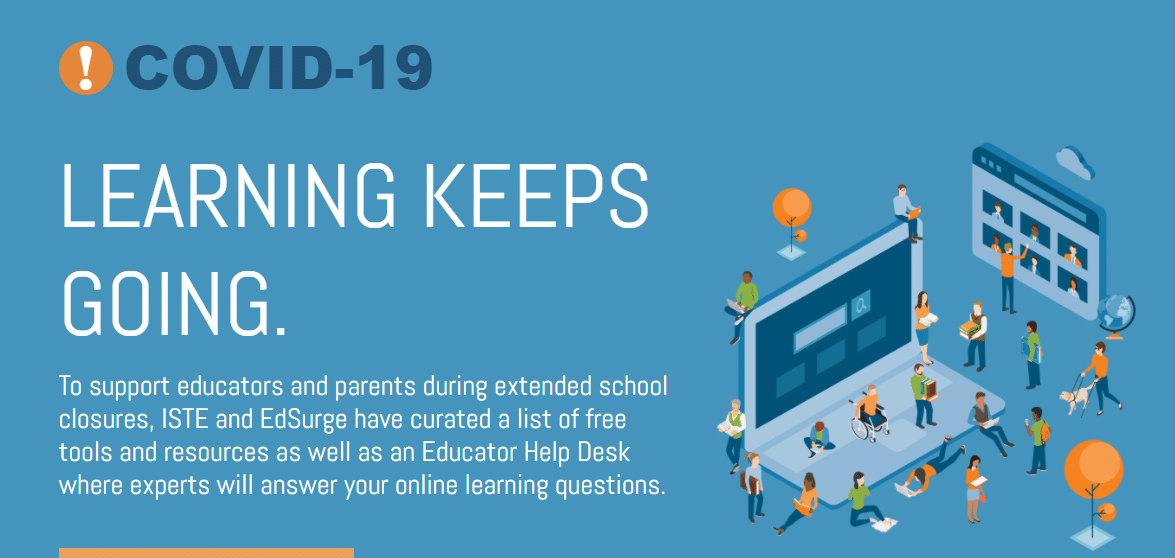 In early spring of 2020, AACTE joined ISTE’s LearningKeepsGoing Coalition. The Coalition subcommittees include Higher Education, of which I co-chair along with AACTE Innovation and Technology Committee Co-Chair David Slykhuis.
In early spring of 2020, AACTE joined ISTE’s LearningKeepsGoing Coalition. The Coalition subcommittees include Higher Education, of which I co-chair along with AACTE Innovation and Technology Committee Co-Chair David Slykhuis.
Each subcommittee developed resources that address the COVID19 pandemic in our nation’s public schools. The Coalition recently released two new resources for Institutions of Higher Education Educator Prep Programs and teacher candidates! The resources target different audiences. The student agency infographic is a resource for educator candidates and educator preparation faculty. As colleges and universities develop online course offerings, candidates are faced with learning how to access and benefit from online instruction. The infographic begins by amplifying five areas of student agency. Ten strategies guide students to advocate for online learning supports, use their own assets, and seek our mentors, to name a few. Students can also take an online learning readiness assessment to determine their preparedness for online instruction. Educator preparation faculty and staff are encouraged to disseminate this infographic to candidates who are learning online.
23 Oct2020
By Margaret Caspe
 Decades of research confirm the importance of families, schools, and community working together to launch students on successful trajectories. Yet, teachers attribute lack of preparation as one of their greatest barriers to building relationships with families and their greatest fear for failure. As a result, in January of 2020, the National Association for Family School and Community Engagement (NAFSCE) partnered with AACTE, CAEP, MAEC, the NEA, and selected faculty and state leaders to form the Pre-Service Family Engagement Consortium to enhance how educators are prepared to engage families and communities.
Decades of research confirm the importance of families, schools, and community working together to launch students on successful trajectories. Yet, teachers attribute lack of preparation as one of their greatest barriers to building relationships with families and their greatest fear for failure. As a result, in January of 2020, the National Association for Family School and Community Engagement (NAFSCE) partnered with AACTE, CAEP, MAEC, the NEA, and selected faculty and state leaders to form the Pre-Service Family Engagement Consortium to enhance how educators are prepared to engage families and communities.
20 Oct2020
By Nicole Dunn
AACTE invites you to participate in a webinar hosted by the Wallace Foundation and RAND to discuss insights from The Partnerships for Social Emotional Learning Initiative (PSELI).
PSELI is a comprehensive, multiyear initiative funded by The Wallace Foundation to explore whether and how students can benefit from intentional partnerships between schools and afterschool/out-of-school time programs focused on building social-emotional skills—and what it takes to do this work.
This free webinar, will share important insights from a new RAND report, Early Lessons From Schools and Out-of-School Time Programs Implementing Social and Emotional Learning, that examines 38 sites in six communities during the first two years of the PSELI initiative. AACTE encourages members not to miss this event at a time when interest in SEL is outstripping empirical guidance about how to implement these programs and practices.
Researchers from RAND will focus on topics such as developing adults’ capacity to promote SEL, improving climate and delivering SEL instruction to students, executing system-level activities to launch and coordinate SEL work across multiple sites, and developing partnerships between schools and afterschool/out-of-school time programs.
20 Oct2020
By Caitlin Wilson
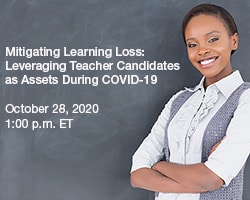 As students and teachers continue to navigate remote and hybrid learning environments, many are feeling overwhelmed. Parents and teachers are worried about the learning loss that has already and continues to occur during the pandemic. District staff are trying to address budget and service delivery uncertainty posed by the COVID-19 crisis. All of these factors may minimize important opportunities for collaboration between educator preparation programs and school districts. However, the repeated pandemic theme of getting through this together may be the key to addressing some of these challenges. Through collaboration with P-12 teachers, teacher candidates can assist in remote and hybrid learning in several ways to include co-teaching and one-on-one student support.
As students and teachers continue to navigate remote and hybrid learning environments, many are feeling overwhelmed. Parents and teachers are worried about the learning loss that has already and continues to occur during the pandemic. District staff are trying to address budget and service delivery uncertainty posed by the COVID-19 crisis. All of these factors may minimize important opportunities for collaboration between educator preparation programs and school districts. However, the repeated pandemic theme of getting through this together may be the key to addressing some of these challenges. Through collaboration with P-12 teachers, teacher candidates can assist in remote and hybrid learning in several ways to include co-teaching and one-on-one student support.
To discuss these opportunities for collaboration and to share examples of how teacher candidates are supporting teachers during this crisis, CCSSO is hosting a webisode on Mitigating Learning Loss: Leveraging Teacher Candidates as Assets During COVID-19. This webisode will feature key recommendations and discussion around the joint issue brief from CEEDAR, the Center for Great Teachers and Leaders at AIR, and AACTE released this summer: Addressing Shortages of Educators in an Uncertain COVID-19 Landscape: Viewing Teacher Candidates as Assets.
02 Oct2020
By Nicole Dunn
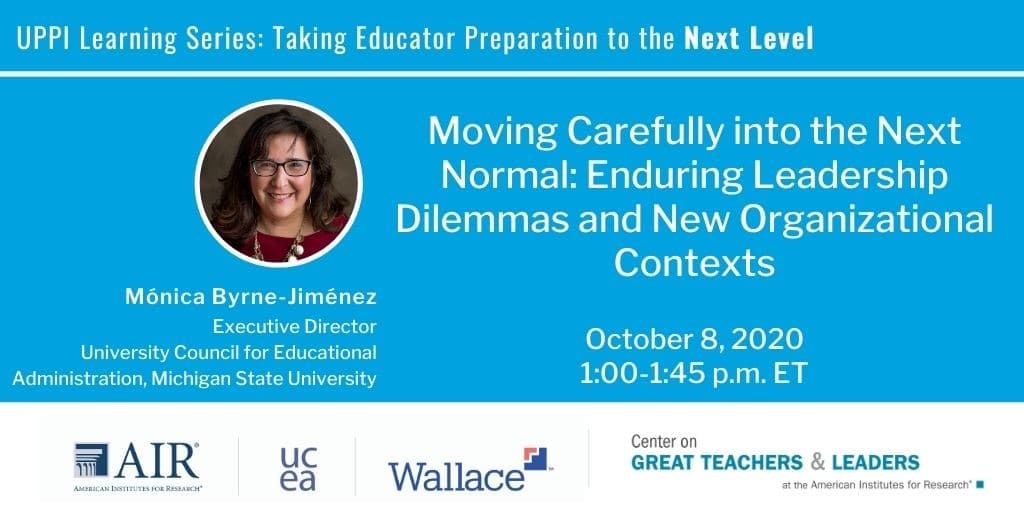
AACTE invites you to join the fifth and final session of The Wallace Foundation’s University Principal Preparation Initiative (UPPI) learning series. This session, Moving Carefully into the Next Normal: Enduring Leadership Dilemmas and New Organizational Contexts, will explore the question, “how can the teaching and learning faculty and education leadership faculty work together to prepare the next generation of school leaders?” Deans, department chairs, faculty, and district staff will receive a protocol designed to explore the assets of each department and how they can be combined to better prepare leaders.
21 Sep2020
By Elizabeth Langran
 In April, The Society for Information Technology and Teacher Education (SITE) did what many organizations had to do. We transitioned our annual conference to an online format, and we discovered we were still able to have rich conversations with our SITE members around the world. Spurred on by this success, we have been planning a new fall event we are calling the SITE Interactive Online Conference, which will take place October 26-28.
In April, The Society for Information Technology and Teacher Education (SITE) did what many organizations had to do. We transitioned our annual conference to an online format, and we discovered we were still able to have rich conversations with our SITE members around the world. Spurred on by this success, we have been planning a new fall event we are calling the SITE Interactive Online Conference, which will take place October 26-28.
We hope this will be a way of connecting our SITE community in-between the annual spring conferences and allow us to have an event with more practitioner and conversation-oriented sessions. While there will still be opportunities to present research papers as we do at our annual spring research conference, we have added new presentation categories (such as birds of a feather, best practices/demo teaching, and practitioner panels) to provide space for conversations around the important issues facing teacher education today. With a conference rate of $150 and a special rate of $55 for students, we especially hope to see many graduate students and early-career faculty join us.
Proposals are due Friday, September 25 on our website. I hope to see you at SITE Interactive October 26-28!
Elizabeth Langran serves as president of the SITE Executive Board.
11 Sep2020
By Ji Soo Song
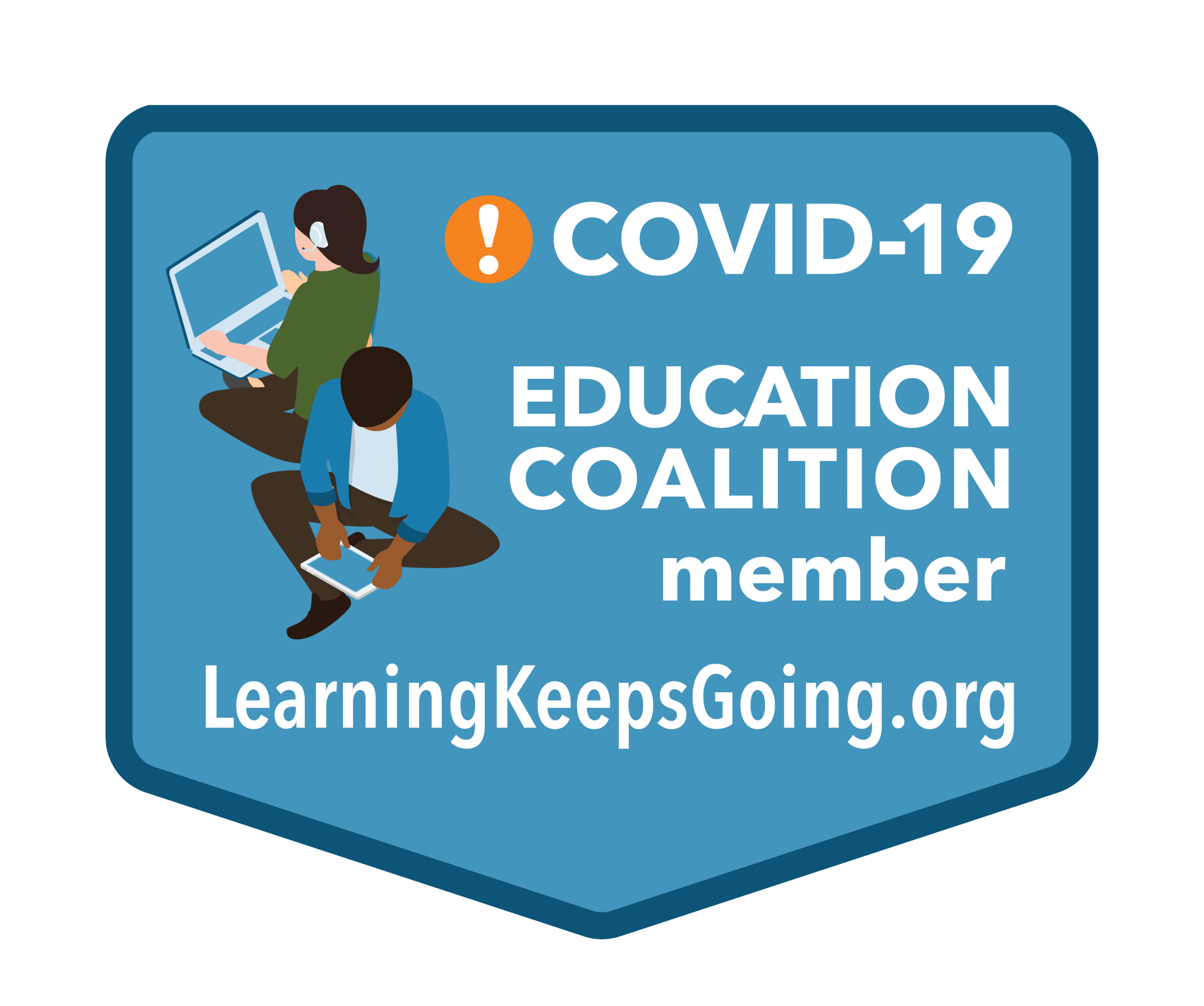 The undersigned members of the COVID-19 Education Coalition offer the following statement on the Delivering Immediate Relief to America’s Families, Schools and Small Businesses Act:
The undersigned members of the COVID-19 Education Coalition offer the following statement on the Delivering Immediate Relief to America’s Families, Schools and Small Businesses Act:
Our coalition is deeply concerned with the Delivering Immediate Relief to America’s Families, Schools and Small Businesses Act because of its low education funding levels, its fixation on physical reopenings of school buildings, and its failure to provide direct support for professional development in online learning. The bill would provide just $70 billion in additional K-12 education stabilization funds, a figure that is far short of the $200 billion that many educational groups feel is required to meet their needs. Additionally, we are concerned that the bill would condition receipt of two-thirds of this funding to the physical reopening of school buildings. This requirement ignores recent reports showing that 95% of districts plan to offer remote instruction to some degree, with about a third planning on remote instruction exclusively. This restriction makes no sense and will only adversely impact marginalized communities, including students of color, homeless students, students in foster care, and students with disabilities.
We also must note that this bill fails to provide separate funding for a key priority: professional development for online learning. Recently released studies point to the urgent need to support educators to deliver effective and equitable learning experiences. For example, more than one-fifth of educators have not received any training as it relates to technology-based remote instruction. A separate survey shows that a majority of novice educators do not feel well-prepared to provide online learning experiences for their students, as their preparation programs had not trained them on research-based technology integration frameworks.
08 Sep2020
By Katrina Norfleet
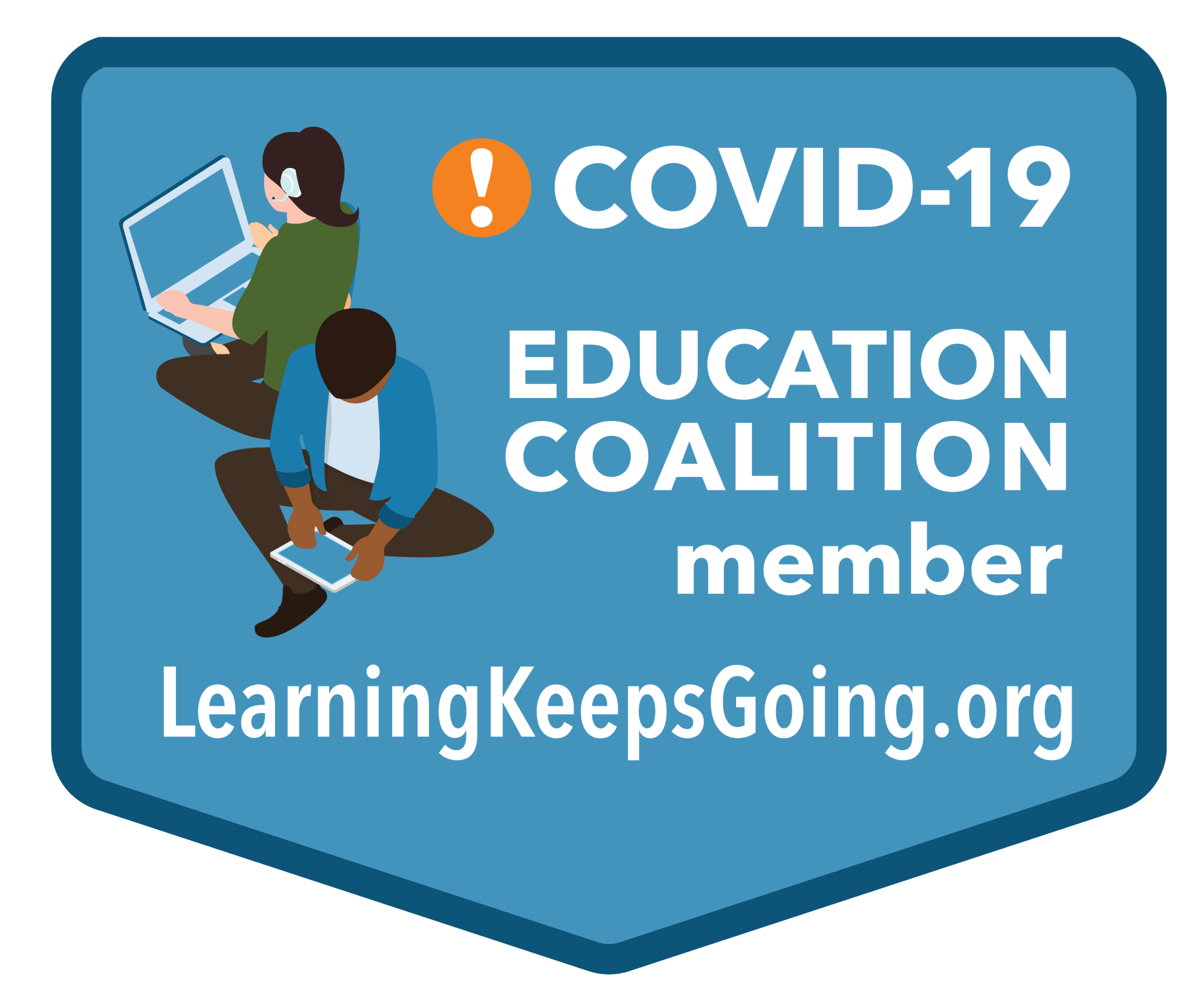 Now that technology is playing a larger role than ever before in teaching and learning, the COVID-19 Education Coalition has curated a list of resources on keeping technology systems safe, protecting student data, and promoting healthy digital decision-making in the newly released A Learning System for Privacy, Security and Digital Citizenship Infrastructure.
Now that technology is playing a larger role than ever before in teaching and learning, the COVID-19 Education Coalition has curated a list of resources on keeping technology systems safe, protecting student data, and promoting healthy digital decision-making in the newly released A Learning System for Privacy, Security and Digital Citizenship Infrastructure.
As a member of the COVID-19 Education Coalition, AACTE invites members to access this informational resource. It was created to do the following: understand the relationship between privacy and security as well as have models of effective practices in safeguarding student data; understand the roles, responsibilities, and rights of students in virtual learning environments; and understand the numerous stakeholders playing a role in student “data stewardship” and “digital citizenship” (i.e., teachers, administrators, parents, vendors, and the students themselves) and how their role is critical for both short- and long-term success.
08 Sep2020
By Jacqueline Rodriguez
AACTE has partnered with CoSN (The Consortium for School Networking) to provide school leaders with high-quality information on emerging issues and technology trends for K-12 innovation. Recently, the international advisory board of about 100 education leaders identified 15 key hurdles, accelerators, and tech enablers for schools to leverage in 2020 in order to drive innovation in K-12 education.
AACTE is proud to be a member of the advisory board for CoSN’s Driving K12 Innovation Project. The next generation of teachers and leaders are being prepared at our member institutions. In collaboration with our K-12 school district colleagues, educator preparation programs can leverage technology that supports the learning and social emotional growth of all our students.
CoSN and AACTE are committed to advancing progressive practices in the field and addressing challenges and opportunities such as data privacy and ownership, social emotional learning, and tools for privacy and safety online.
CoSN’s Driving K-12 Innovation
CoSN will issue its insights and findings from the advisory board in two individual free briefs. These publications, along with an implementation toolkit, are being released throughout 2020 to spur ongoing discussions and visibility that analyze the top hurdles, accelerators and technology enablers in K-12 education. This project is part of CoSN’s EdTechNext initiative, extending their long-standing work surrounding emerging technologies. The Driving K-12 Innovation initiative is supported by AACTE.
 Mursion CEO Mark Atkinson hosted AACTE’s President and CEO Lynn M. Gangone for a virtual fireside chat in culmination of a multi-part series highlighting how Mursion’s virtual simulation classroom is being used in educator preparation programs. To start the conversation, Gangone reflected on how the pandemic has shaped the need to collaborate and to think differently on the delivery of instruction in the P-20 setting. She noted, “In our strategic planning process we created a vision to revolutionize education for all learners. We had no idea how prescient that was because of the pandemic.”
Mursion CEO Mark Atkinson hosted AACTE’s President and CEO Lynn M. Gangone for a virtual fireside chat in culmination of a multi-part series highlighting how Mursion’s virtual simulation classroom is being used in educator preparation programs. To start the conversation, Gangone reflected on how the pandemic has shaped the need to collaborate and to think differently on the delivery of instruction in the P-20 setting. She noted, “In our strategic planning process we created a vision to revolutionize education for all learners. We had no idea how prescient that was because of the pandemic.”






 Last month, AACTE partnered with CCSSO, the Center on Great Teachers and Leaders at the American Institutes for Research, and the CEEDAR Center to discuss how teacher candidates can be leveraged as assets for PK-12 districts navigating online learning and uncertainty during the pandemic. During the webisode hosted by CCSSO, Loretta Mason-Williams from Binghamton University, Jacqueline Rodriguez from AACTE, and Christian Rodgers from AASA set the stage for how the needs of teacher candidates, schools, and families are changing in 2020. With this shift in needs comes opportunities for both schools and teacher candidates.
Last month, AACTE partnered with CCSSO, the Center on Great Teachers and Leaders at the American Institutes for Research, and the CEEDAR Center to discuss how teacher candidates can be leveraged as assets for PK-12 districts navigating online learning and uncertainty during the pandemic. During the webisode hosted by CCSSO, Loretta Mason-Williams from Binghamton University, Jacqueline Rodriguez from AACTE, and Christian Rodgers from AASA set the stage for how the needs of teacher candidates, schools, and families are changing in 2020. With this shift in needs comes opportunities for both schools and teacher candidates. Please join us Tuesday, November 17, 1:00 p.m. ET for a joint reflection on 2020 and a look forward to the coming year. Mursion Co-founder and CEO, Mark Atkinson will host a fireside chat with AACTE President and CEO Lynn M. Gangone. Join the conversation as they share their perspectives on
Please join us Tuesday, November 17, 1:00 p.m. ET for a joint reflection on 2020 and a look forward to the coming year. Mursion Co-founder and CEO, Mark Atkinson will host a fireside chat with AACTE President and CEO Lynn M. Gangone. Join the conversation as they share their perspectives on

 The CEEDAR Center is working on a collaborative effort to collect information from educator preparation programs across the country who are implementing effective, practice-based opportunities for teacher candidates within a virtual space. We’d like to invite you, your colleagues, and your partners (if applicable) to participate in a survey focused on online education for teachers of students with disabilities.
The CEEDAR Center is working on a collaborative effort to collect information from educator preparation programs across the country who are implementing effective, practice-based opportunities for teacher candidates within a virtual space. We’d like to invite you, your colleagues, and your partners (if applicable) to participate in a survey focused on online education for teachers of students with disabilities.  In early spring of 2020, AACTE joined ISTE’s
In early spring of 2020, AACTE joined ISTE’s  Decades of research confirm the importance of families, schools, and community working together to launch students on successful trajectories. Yet, teachers attribute lack of preparation as one of their greatest barriers to building relationships with families and their greatest fear for failure. As a result, in January of 2020, the National Association for Family School and Community Engagement (NAFSCE) partnered with AACTE, CAEP, MAEC, the NEA, and selected faculty and state leaders to form the
Decades of research confirm the importance of families, schools, and community working together to launch students on successful trajectories. Yet, teachers attribute lack of preparation as one of their greatest barriers to building relationships with families and their greatest fear for failure. As a result, in January of 2020, the National Association for Family School and Community Engagement (NAFSCE) partnered with AACTE, CAEP, MAEC, the NEA, and selected faculty and state leaders to form the  As students and teachers continue to navigate remote and hybrid learning environments, many are feeling overwhelmed. Parents and teachers are worried about the learning loss that has already and continues to occur during the pandemic. District staff are trying to address budget and service delivery uncertainty posed by the COVID-19 crisis. All of these factors may minimize important opportunities for collaboration between educator preparation programs and school districts. However, the repeated pandemic theme of getting through this together may be the key to addressing some of these challenges. Through collaboration with P-12 teachers, teacher candidates can assist in remote and hybrid learning in several ways to include co-teaching and one-on-one student support.
As students and teachers continue to navigate remote and hybrid learning environments, many are feeling overwhelmed. Parents and teachers are worried about the learning loss that has already and continues to occur during the pandemic. District staff are trying to address budget and service delivery uncertainty posed by the COVID-19 crisis. All of these factors may minimize important opportunities for collaboration between educator preparation programs and school districts. However, the repeated pandemic theme of getting through this together may be the key to addressing some of these challenges. Through collaboration with P-12 teachers, teacher candidates can assist in remote and hybrid learning in several ways to include co-teaching and one-on-one student support.
 In April, The Society for Information Technology and Teacher Education (SITE) did what many organizations had to do. We transitioned our annual conference to an online format, and we discovered we were still able to have rich conversations with our SITE members around the world. Spurred on by this success, we have been planning a new fall event we are calling the SITE Interactive Online Conference, which will take place October 26-28.
In April, The Society for Information Technology and Teacher Education (SITE) did what many organizations had to do. We transitioned our annual conference to an online format, and we discovered we were still able to have rich conversations with our SITE members around the world. Spurred on by this success, we have been planning a new fall event we are calling the SITE Interactive Online Conference, which will take place October 26-28. The undersigned members of the COVID-19 Education Coalition offer the following statement on the Delivering Immediate Relief to America’s Families, Schools and Small Businesses Act:
The undersigned members of the COVID-19 Education Coalition offer the following statement on the Delivering Immediate Relief to America’s Families, Schools and Small Businesses Act: Now that technology is playing a larger role than ever before in teaching and learning, the COVID-19 Education Coalition has curated a list of resources on keeping technology systems safe, protecting student data, and promoting healthy digital decision-making in the newly released
Now that technology is playing a larger role than ever before in teaching and learning, the COVID-19 Education Coalition has curated a list of resources on keeping technology systems safe, protecting student data, and promoting healthy digital decision-making in the newly released